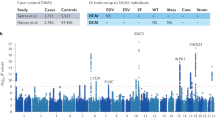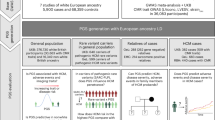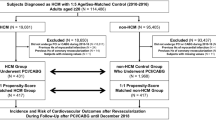Abstract
Increasing numbers of patient relatives at risk of developing dilated or hypertrophic cardiomyopathy (DCM/HCM) are being identified and followed up by cardiologists according to the ACC/ESC guidelines. However, given limited healthcare resources, good-quality low-cost alternative approaches are needed. Therefore, we have compared conventional follow-up by a cardiologist with that provided at a cardiogenetic clinic (CGC) led by a genetic counsellor. Phenotype-negative first-degree relatives at risk for DCM/HCM were randomly assigned to see either a cardiologist or to attend a CGC. Uptake and resource use were recorded. For 189 participants, we evaluated quality of care experienced, patient satisfaction and perceived personal control (PPC) using validated questionnaires and estimated the average cost difference of these two modes of care. Maximum patient satisfaction scores were achieved more frequently at the CGC (86% vs 45%, P<0.01). In terms of follow-up care provided, the genetic counsellor did not perform worse than the cardiologist (95% vs 59%, P<0.01). The genetic counsellor more often enquired about the relative-at risk’s health (100% vs 65%, P<0.01) and family health (97% vs 33%, P<0.01), measured blood pressure (98% vs 29%, P<0.01) and gave disease-specific information (77% vs 52%, P<0.01). Although PPC scores were equal in both groups, the average cost per patient of CGC follow-up was 25% lower. Follow-up of phenotype-negative relatives at risk for DCM/HCM at a CGC led to greater patient satisfaction and is well-appreciated at lower cost. CGC care is a good alternative to conventional cardiological follow-up for this growing group of patients.
Similar content being viewed by others
Log in or create a free account to read this content
Gain free access to this article, as well as selected content from this journal and more on nature.com
or
References
Maron BJ, McKenna WJ, Danielson GK et al: American College of Cardiology/European Society of Cardiology Clinical Expert Consensus Document on Hypertrophic Cardiomyopathy; a report of the American College of Cardiology Foundation Task Force on Clinical Expert Consensus Documents and the European Society of Cardiology Committee for Practice. Eur Heart J 2003; 24: 1965–1991.
Gersh BJ, Maron BJ, Bonow RO et al: 2011 ACCF/AHA Guideline for the Diagnosis and Treatment of Hypertrophic Cardiomyopathy: a report of the American College of Cardiology Foundation/American Heart Association Task Force on Practice Guidelines. J Am Coll Cardiol 2011; 58: e212–e260.
Watkins H, Ashrafian BM, Redwood C : Inherited cardiomyopathies. N Engl J Med 2011; 364: 1643–1656.
Strömberg A, Mårtensson J, Fridlund B et al: Nurse-led heart failure clinics improve survival and self-care behaviour in patients with heart failure. Results from a prospective, randomised trial. Eur Heart J 2003; 24: 1014–1023.
Broers CJM, Sinclair N, Van der Ploeg TJ et al: The post-infarction nurse practitioner: a prospective study comparing nurse intervention with conventional care in a non-high-risk myocardial infarction population. Neth Heart J 2009; 17: 61–67.
Jaarsma T, Strömberg A : Heart failure clinics are still useful (more than ever?). Can J Cardiol 2014; 30: 272–275.
Skirton H, Cordier C, Ingvoldstad C et al: The role of the genetic counsellor: a systematic review of research evidence. Eur J Hum Genet 2015; 23: 452–458.
Caleshu C, Kasparian NA, Edwards KS et al: Interdisciplinary psychosocical care for families with inherited cardiovascular diseases. Trends Cardiovasc Med 2016; 26: 647–653.
Van Spaendonck-Zwarts KY, Van Rijsingen IA, Van den Berg MP et al: Genetic analysis in 418 index patients with idiopathic dilated cardiomyopathy: overview of 10 years' experience. Eur J Heart Fail 2013; 15: 628–636.
Van der Zwaag PA, Van Rijsingen IA, Asimaki A et al: Phospholamban R14del in patients diagnosed with dilated cardiomyopathy or arrhythmogenic right ventricular cardiomyopathy: evidence supporting the concept of arrhythmogenic cardiomyopathy. Eur J Heart Fail 2012; 14: 1199–1207.
Berkenstadt M, Shiloh S, Barkai G et al: Perceived personal control (PPC): a new concept in measuring outcome of genetic counseling. Am J Med Genet 1999; 82: 53–59.
Smets EMA, Pieterse AH, Aalfs CM et al: The perceived personal control (PPC) questionnaire as an outcome of genetic counseling: reliability and validity of the instrument. Am J Med Genet 2006; 140: 843–850.
Zellerino B, Milligan SA, Brooks R et al: Development, testing, and validation of a patient satisfaction questionnaire for use in the clinical genetics setting. Am J Med Genet 2009; 151C: 191–199.
Schumi J, Witte JT : Through the looking glass: understanding non-inferiority. Trials 2011; 12: 106.
Bertakis KD, Franks P, Azari R : Effects of physician gender on patient satisfaction. J Am Womens Assoc 2003; 58: 69–75.
Acknowledgements
We thank all the participants and the Department of Cardiology of the University Medical Center Groningen (UMCG) and the Antonius Hospital in Sneek. We also thank Jackie Senior and Kate Mc Intyre for editing this manuscript. This work was supported by the Health Care Efficiency Research Pilot programme of the University Medical Center Groningen, Groningen, the Netherlands.
Author information
Authors and Affiliations
Corresponding author
Ethics declarations
Competing interests
The authors declare no conflict of interest.
Rights and permissions
About this article
Cite this article
Nieuwhof, K., Birnie, E., van den Berg, M. et al. Follow-up care by a genetic counsellor for relatives at risk for cardiomyopathies is cost-saving and well-appreciated: a randomised comparison. Eur J Hum Genet 25, 169–175 (2017). https://doi.org/10.1038/ejhg.2016.155
Received:
Revised:
Accepted:
Published:
Issue date:
DOI: https://doi.org/10.1038/ejhg.2016.155
This article is cited by
-
High societal costs and reduced health-related quality of life in inflammatory and systemic immune disease-associated dilated cardiomyopathies
Quality of Life Research (2025)
-
A systematic literature review of economic evaluations and cost-of-illness studies of inherited cardiomyopathies
Netherlands Heart Journal (2023)
-
Clinical Implications of the Genetic Architecture of Dilated Cardiomyopathy
Current Cardiology Reports (2020)



